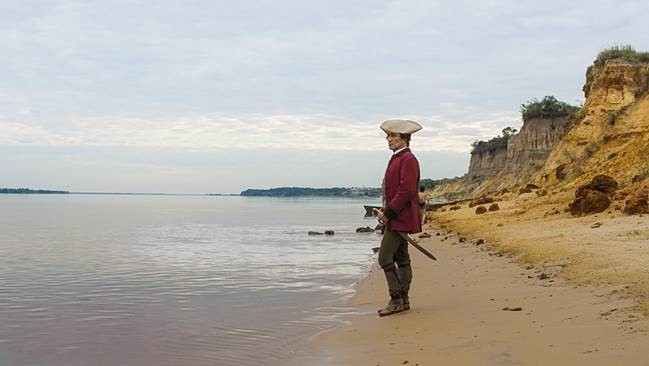
Lucrecia Martel’s ‘Zama’ was named as one of our 10 essential films of 2017. To celebrate its UK release, we revisit the revealing masterclass the acclaimed Argentinean filmmaker gave during last year’s London Film Festival, where ‘Zama’ also had its UK premiere. Her long-awaited fourth feature, which took almost a decade to get made, is the first literary adaptation in Martel’s career, based on the 1956 Antonio Di Benedetto’s novel, which is set In the late 18th century and tells the story of Spanish official Don Diego De Zama, whom after years of dedicated service to the Spanish crown in a remote position somewhere in the South American, he believes he’s entitled to a promotion for a place in a better destination. His increasingly delusional longings serve as a reflection on the trappings of personal and social identity as well as taking an incisive, critical look at the ways of colonialism.
Interviewed by professor Maria Delgado and boasting both a healthily sarcastic sense of humour and an endless capability for amazing digression, among other things, Martel talked about her career, the themes and preoccupations’ on her body of work, some of her philosophical theories and what kept her so long from making another film after her masterpiece ‘The Headless Woman’.

Asked for Zama as a film that takes time to make sense, the Argentinean auteur told us about how her relationship with narrative came from oral tradition. She gave the example of her frequent and long telephone conversations with her mother which normally ended asking herself “why did she call me?” and two days later she had a vague idea of the reason. Her films, like those of many other directors, don’t revolve around a plot. When films have got a strong plot, she believes, at the end the satisfaction is immediate. We tend to be desperate to make everything quick on the way they feel or get understood, but things don’t really work like that.
On an introduction of her film in New York, she asked the audience to take it like a whisky, sometimes bitter, sometimes sweetly hallucinatory, and Zama indeed possesses this quality that challenges space and time linear conventions. Joking about her film’s sleep-inducing qualities, as other auteurs such as Apichatpong Weerasethakul has often done, she defended sleeping during a movie as a positive thing, mentioning Bergman’s ‘The Silence’ as a film she has watched hundreds of times because she normally falls asleep watching it. On that respect, she affirmed that when one falls asleep the film disappears from the eyes but its sound is still working and affecting us.
Zama, in spite of its many differences with the rest of her filmography, namely is shot in digital, with a male protagonist, is an adaptation of someone else’s work and not shot on her usual location, is very close to the rest. The director also noticed that the main characters in all of them are in the periphery of power, a situation she identifies herself with because is the life the majority of people live. There’s always someone above us, while we try to lead or little lives. And she explained her use of little because life is normally short of the big expectations we have about it.
Praising the original novel as extraordinary, Martel indicated that it was originally dedicated to the victims of waiting. “A sort of lunacy that prevails in our culture, we have all been told that we have to be somebody in life, as if being alive wouldn’t automatically make you somebody. There’s somebody else you need to be. When a human being says he is something, a time line with a set of obligations is generated. For someone who told her family she wanted to make films, automatically their family’s thoughts of the best that could happen to her was “to win an Oscar”. Each thing one affirms about oneself generates an inevitable time line, first in other people’s minds and then in their own She joked again mentioning that this film was selected for the Oscar, but did not get a nomination, so in the mind of others, she failed. “It’s easy to fail with what one did not want in the first place”.

The novel is a monologue written in first person, so the filmmaker thought the most interesting approach would be to film the scenes that later would have caused Zama to write his own story. She then gave a personal theory about why when someone talks for a long time, his voice’s tone changes and fluctuates. The reason why she thinks that happens is because when we talk, our voice is not just ours but many others’ and that multitude of voices is what generates those accidents during speech.
When asked how she got through the process of writing a script, finding funding and finally making the film, the Argentinean took the chance to vent his criticism about the existence of a single hegemonic narrative that has been imposed over any other type of cinema. She affirmed we are living in a moment when a seventy year old woman and a kid of 8 both like ‘Breaking Bad.’ She highlighted this fact as a phenomenon that’s particular to our times and has never happened before. That hegemonic narrative is mostly in the English language. That becomes a problem when trying to make a film in a foreign director’s mother tongue. Her type of films would be difficult enough to make in English, but when are made in another language the difficulties multiply. After a year looking for funding, many well intentioned producers tried to convince her that filming in English would make things much easier, as the market for it is the whole world. The market, though, does not consider the language as a human right. The market has the ability to disrespect something, without that being noticed as a lack of respect. Existence is something very mysterious and we need everyone’s opinions to understand it. The more opinions exist, the more heterogeneous the narrative, the better for everyone, but that’s not what the market believes. We need many versions of the world.
The problem with Hollywood in her opinion is that the narrative homogeneity it generates has dramatically reduced the space for other types of cinema. “We can’t just think that all stories are like what Richard Gere and Julia Roberts do in ‘Pretty Woman.’ We need many more and more diverse versions of the world, because what they represent is a very small part of the world”. Everybody needs to work, but it comes easier if you accommodate yourself in that sort of narrative. However, she also believes, it is great fun not to make that type of cinema. To be outside the prevailing model it’s difficult, but it’s also very satisfactory.
Then she talked about what was initially expected to be her fourth film, ‘El Eternauta,’ an adaptation of an iconic Argentinean comic about an extraterrestrial invasion in Buenos Aires that did not come to fruition. Coincidentally, this comic was released at the same time Zama was published (in the 1950s) She remembered being working on that adaptation and thinking a lot about what is time: past, present, future. The comic was released in the past but, as most science fiction, is set up in the future. The project did not work due to disagreements with her producers. However, that screenplay ended when the survivors to the invasion escaped in boats against the current of the Parana River. After a year in a half of work, Martel was wondering how to escape from the comic’s world she had been immersed in and decided to do what the survivors in the comic did .She had a small timber boat and went sailing towards Paraguay. The problem was the boat was quite old, she had not much experience as a captain and it was the worst time of the year to embark on that trip.
Zama had quite an adventurous gestation for that journey Martel took many readings related to the river, from expedition accounts that took place in the XVII and XVIII centuries to Di Benedetto’s novel. In the middle of the storms of a rather problematic journey she finally read it. From that moment on, she started thinking about the past. The fact we normally consider period dramas and science fiction movies as two very different things, she believes, is a shame because normally we think about the future with a lot of freedom, but when our thoughts about the past seem to be tied up to its sources. That’s the reason why, after talking to her habitual filmmaking team, they decided to shape Zama as if it was a work of science fiction; a decision based in the political idea of not going towards the past embracing the historical sources as if they were real, but instead approaching it with hypothesis as we do when we think about the future. Latin America is a continent that has been told by the European man, what are the chances they have told the truth about its history? Therefore, she argued, the continent’s story as we know it is science fiction.
Zama is released in the UK on May the 25th.
